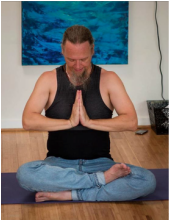My checkered academic past went all over, from Environmental Studies, to Business and Merchandising, to Anthropology, to Linguistics and into Middle Eastern Studies. So, I've taken a lot of cultural and physical anthropology classes in my time (good prep work for anatomy studies!), and of course, archaeology.
And, I'm a traveller, and a student of history and cultures, so I've been on and to digs, and sites, and works. It's fascinating, and it's a piece of the ribbon of continuity of our species - to dig into the Earth to uncover them, and in doing so, of course, learn about ourselves.
So, I'm offering it to you, like this - when the archaeologist wants to understand the present, he seeks the past, in study. He chooses a site, and very painstakingly and deliberately, plots the earth, and goes to work. The work is tedious, and gentle, and mindful. It involves removing an enormous amount of 'overburden', but not in the grossest means possible; rather, the most subtle.
The tools of the trade are small trowels and hand shovels and dental picks and micro-brushes. They work, days on end, knowing something lies below, but watching every single layer of accumulated history be peeled, gently away. The layers in the earth tell the tales: ash from wildfires, consistently shaped rubble from prior foundations, even the over-abundance of pollen in a blooming year may be captured and held. The archaeologist doesn't miss these clues, these pieces, these evolutions, as time literally accumulates history vertically.
And, if you've ever seen a site, the 'best' we see is when the history was calamitous - horrible, tragic endings usually preserve history (retain their impression) the best. Pompeii, for example. That may be how it is with us. As we dig into ourselves, if we don't take the time, go slowly, peel away and mindfully examine the layers, what are we missing? Can we stay mindful enough to dig deep, but carefully? To watch, every turn of the trowel, ever sweep of the brush?
To bring it to close, I'll also tell you, aside from cataclysm, the other most fertile ground in archeological history is the trash heaps. Yup, the refuse piles - you can see what they ate, what they consumed, the shards of their pottery, the casting off of the unwanted parts of the diet, all of the tales are told in our trash, in our shit. Unpleasant, surely. But fertile for understanding, for getting down to the matter, and for digging in deep. What lies in you, discarded and buried? What tale would it tell if you so carefully and mindfully excavated it?
Dig it? Give thanks and praise!



